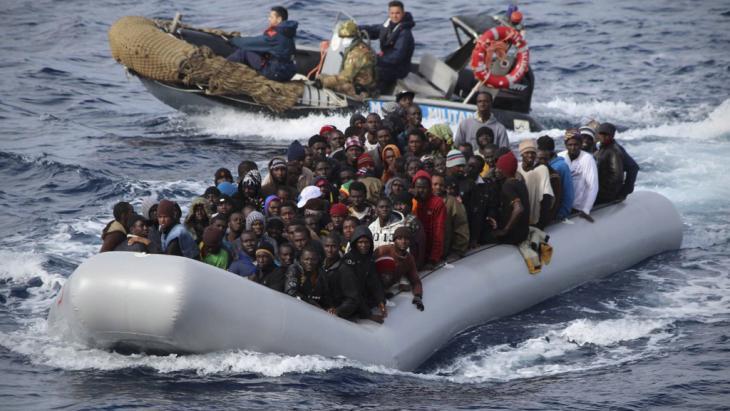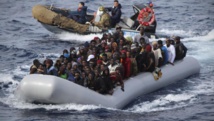The North African country has 1,770 kilometres of coastline and 5,000 kilometres of porous land borders in mostly arid areas that are sparsely populated.
In the Kadhafi era, the Libyan authorities were unable to fully control their frontiers, with hundreds of people crossing them daily from sub-Saharan Africa via Sudan, Niger and Chad.
The main source of the illegal migrants is northern Niger, a stronghold of trafficking networks.
Kadhafi used immigration to pressure Europe, opening and closing gates to migrants depending on the state of relations with EU members, notably former colonial power Italy.
The dictator, who was slain in Libya's 2011 uprising, used to claim from Europe five billion euros ($5.37 billion) per year for border surveillance and the fight against people smuggling.
Between 2008 and 2011, the flow of illegal migrants from Libya to Europe dried up after the signing of a treaty with Rome.
But following Kadhafi's ouster, Libya has once again emerged as a hub for smugglers who operate without impunity.
More than 110,000 migrants crossed through Libyan territory in 2014 alone, according to the United Nations.
Who is behind the trafficking?
The militias now in control of much of Libya include extremist groups like Ansar al-Sharia, which make vast sums of money from trafficking, either through organising it themselves or charging groups that pass through their territory.
"There is no effective government in Libya to limit human trafficking, or even have some minimum control of borders anymore," said Issandr El Amrani of the International Crisis Group think-tank.
"It has become much easier for traffickers to get people across Libya, with no police or army to stop them."
The smugglers operate in networks, "with migrants being handed over from one trafficker to the next before ending up in boats," he told AFP.
"Sometimes the pickups, which take place in the desert, do not happen and the migrants get abandoned.
"Some have been found nearly dead of thirst -- the tragedies do not only occur at sea."
Karim Bitar, an expert on geopolitics in the Middle East, said immigrants have become nothing but a "commodity" in the eyes of the traffickers.
They were "taken hostage in the war between the militias and are paying a heavy price for the security vacuum".
Since 2011, the transitional authorities in Libya tasked militias with keeping watch along the country's borders.
But it is these same militias in the pay of the state that are now engaging in trafficking, experts say.
Italy said Monday it is studying the possibility of mounting "targeted interventions" against Libya-based people smugglers in order the stem the deadly trafficking.
Who are the migrants?
Before 2011, the vast majority of the migrants came from sub-Saharan African countries like Niger, Sudan, Somalia, Eritrea and Ghana as well as Cameroon and Gabon.
Most of them spent several months in Libya, working and saving up to fund their journey to Europe, at a cost of between $1,000 and $2,000.
After Kadhafi's fall and the outbreak of conflicts across the Middle East, especially in Syria, Libya also became a transit country for those fleeing violence.
"It is no coincidence that a large number of the migrants found crossing the Mediterranean are from conflict-torn countries such as Syria, Palestine, Eritrea, or Mali," said El Amrani.
For Europe, he said, the aim should now be to address "the root causes of migration, which are not just poverty or lack of opportunity, but increasingly, conflicts that have created large refugee populations."
Colonel Rida Ben Issa of the coastguard in Misrata, east of Tripoli, said the EU and Italy should fulfil a Libyan request to provide it with boats to tackle the problem.
"Europe should help the Libyan coastguard. We have the men, the capacity and competent professionals," he told AFP.
------------------------------------------------------------------------------------------------------------
In the Kadhafi era, the Libyan authorities were unable to fully control their frontiers, with hundreds of people crossing them daily from sub-Saharan Africa via Sudan, Niger and Chad.
The main source of the illegal migrants is northern Niger, a stronghold of trafficking networks.
Kadhafi used immigration to pressure Europe, opening and closing gates to migrants depending on the state of relations with EU members, notably former colonial power Italy.
The dictator, who was slain in Libya's 2011 uprising, used to claim from Europe five billion euros ($5.37 billion) per year for border surveillance and the fight against people smuggling.
Between 2008 and 2011, the flow of illegal migrants from Libya to Europe dried up after the signing of a treaty with Rome.
But following Kadhafi's ouster, Libya has once again emerged as a hub for smugglers who operate without impunity.
More than 110,000 migrants crossed through Libyan territory in 2014 alone, according to the United Nations.
Who is behind the trafficking?
The militias now in control of much of Libya include extremist groups like Ansar al-Sharia, which make vast sums of money from trafficking, either through organising it themselves or charging groups that pass through their territory.
"There is no effective government in Libya to limit human trafficking, or even have some minimum control of borders anymore," said Issandr El Amrani of the International Crisis Group think-tank.
"It has become much easier for traffickers to get people across Libya, with no police or army to stop them."
The smugglers operate in networks, "with migrants being handed over from one trafficker to the next before ending up in boats," he told AFP.
"Sometimes the pickups, which take place in the desert, do not happen and the migrants get abandoned.
"Some have been found nearly dead of thirst -- the tragedies do not only occur at sea."
Karim Bitar, an expert on geopolitics in the Middle East, said immigrants have become nothing but a "commodity" in the eyes of the traffickers.
They were "taken hostage in the war between the militias and are paying a heavy price for the security vacuum".
Since 2011, the transitional authorities in Libya tasked militias with keeping watch along the country's borders.
But it is these same militias in the pay of the state that are now engaging in trafficking, experts say.
Italy said Monday it is studying the possibility of mounting "targeted interventions" against Libya-based people smugglers in order the stem the deadly trafficking.
Who are the migrants?
Before 2011, the vast majority of the migrants came from sub-Saharan African countries like Niger, Sudan, Somalia, Eritrea and Ghana as well as Cameroon and Gabon.
Most of them spent several months in Libya, working and saving up to fund their journey to Europe, at a cost of between $1,000 and $2,000.
After Kadhafi's fall and the outbreak of conflicts across the Middle East, especially in Syria, Libya also became a transit country for those fleeing violence.
"It is no coincidence that a large number of the migrants found crossing the Mediterranean are from conflict-torn countries such as Syria, Palestine, Eritrea, or Mali," said El Amrani.
For Europe, he said, the aim should now be to address "the root causes of migration, which are not just poverty or lack of opportunity, but increasingly, conflicts that have created large refugee populations."
Colonel Rida Ben Issa of the coastguard in Misrata, east of Tripoli, said the EU and Italy should fulfil a Libyan request to provide it with boats to tackle the problem.
"Europe should help the Libyan coastguard. We have the men, the capacity and competent professionals," he told AFP.
------------------------------------------------------------------------------------------------------------









 Home
Home Politics
Politics











